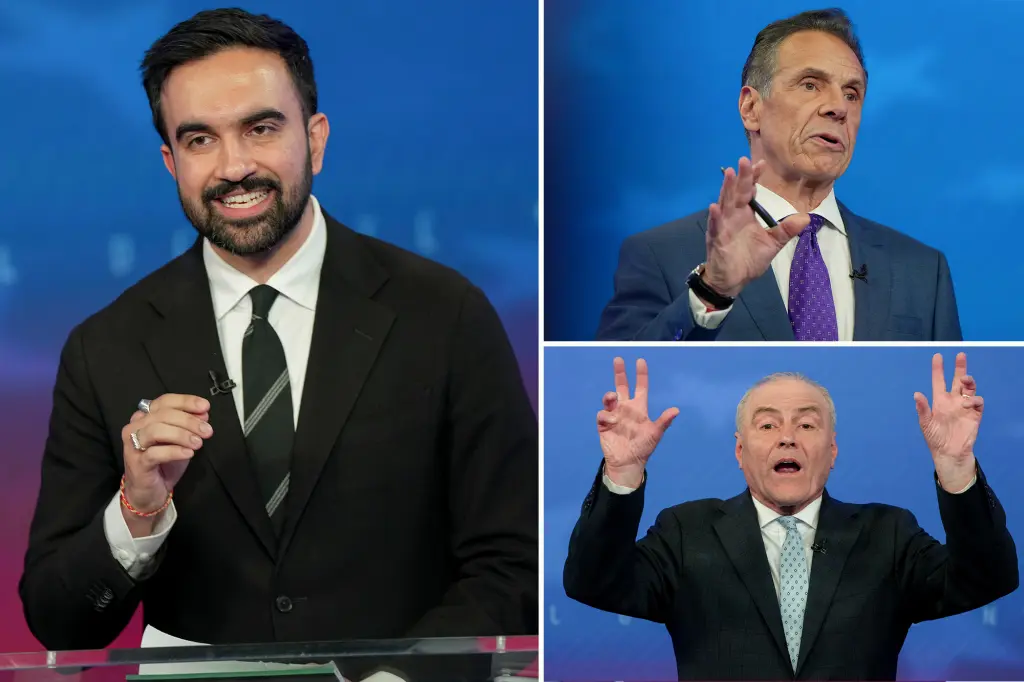Mamdani Maintains Lead in NYC Mayoral Race Despite Heated Debate
In the first general election mayoral debate for New York City, democratic socialist Zohran Mamdani maintained his front-runner status despite strong challenges from his opponents. A panel of political experts observed that while former Governor Andrew Cuomo and Republican nominee Curtis Sliwa delivered solid performances, they failed to significantly alter the dynamics of the race. Mamdani, who has consistently led in the polls, demonstrated remarkable message discipline throughout the debate, continually returning to his core theme of affordability in New York City—a strategy that resonated with voters concerned about the city’s high cost of living. This focus on economic issues has allowed him to maintain his lead even as opponents attempted to challenge him on more divisive topics.
The debate, hosted by NBC 4 New York, Telemundo, and Politico, saw Cuomo and Sliwa repeatedly challenging Mamdani on controversial issues including his stance on Israel, past calls to defund the police, and his relative lack of governmental experience. Republican strategist Bill O’Reilly noted that “all the candidates did well—and that’s the problem for New Yorkers who don’t want a socialist mayor.” Despite these challenges, Mamdani held his ground effectively, with political expert Lee Miringoff stating there was no “aha moment” that would significantly shift voter sentiment. The absence of a game-changing exchange or major misstep by any candidate suggests the race’s trajectory remains largely unchanged following the debate, with Mamdani still in a commanding position.
A Fox News poll released just before the debate reinforced Mamdani’s front-runner status, showing him breaking the 50% threshold for the first time in the race. The poll indicated 52% of likely voters supported Mamdani, while Cuomo and Sliwa trailed significantly at 28% and 14%, respectively. Democratic strategist Bill Cunningham observed that Mamdani didn’t lose any supporters during the debate, and neither Cuomo nor Sliwa landed punches impactful enough to shake up the race. This polling advantage, combined with Mamdani’s steady debate performance, suggests that barring any major developments, he remains well-positioned to win the November 4th election. The approximately 10% of undecided voters are unlikely to swing the race dramatically even if they break for one of the challengers.
Observers praised aspects of each candidate’s performance, with Republican strategist Rob Ryan giving Cuomo high marks for demonstrating his knowledge and experience. “He was well rehearsed and did his best to be affable, which is exceedingly hard for him,” Ryan noted, adding that Cuomo deserved an A for proving he was the most knowledgeable candidate on the issues. Similarly, Ryan highlighted a “new and mature Curtis Sliwa” who appeared serious and well-versed on issues—a departure from his sometimes colorful public persona. Yet despite these strong showings, Mamdani’s ability to remain on message about affordability—which Democratic operative Ken Frydman called “what wins elections”—kept him from suffering any significant setbacks during the two-hour verbal exchange.
Political strategist Andrew Kirtzman pointed out that while Mamdani has vulnerabilities that should make him an “easy target”—including his positions on Israel, Hamas, policing, education, private property rights, taxation, and legalized prostitution—his exceptional communication skills prevented opponents from landing any decisive blows. This generational talent for messaging has been a consistent advantage for Mamdani throughout the campaign. Democratic operative Yvette Buckner characterized the debate as “essentially a rerun of the primary,” noting that “Mamdani stayed calm under fire, and Cuomo didn’t land the kind of punch that was needed to change the race this late in the game.” This composure under pressure has become a hallmark of Mamdani’s campaign style.
As the election approaches on November 4th, the debate appears to have reinforced rather than reshaped the race’s existing dynamics. Mamdani continues to lead comfortably, with his message of addressing New York City’s affordability crisis resonating with a majority of likely voters. While both Cuomo and Sliwa delivered capable performances that may appeal to their respective bases, neither managed to fundamentally alter their standing in the polls or significantly diminish Mamdani’s support. Unless something dramatic occurs in the final days of the campaign, New York City appears poised to elect its first democratic socialist mayor, representing a significant shift in the city’s political landscape. The debate, rather than changing the course of the election, seems to have confirmed the trajectory that polling has indicated for months—a testament to Mamdani’s disciplined campaign and his ability to connect with voters on economic issues that directly impact their daily lives.


